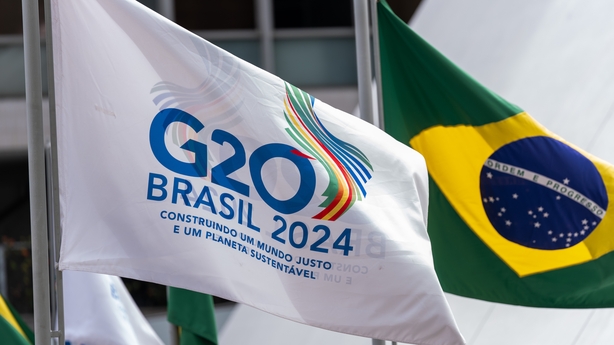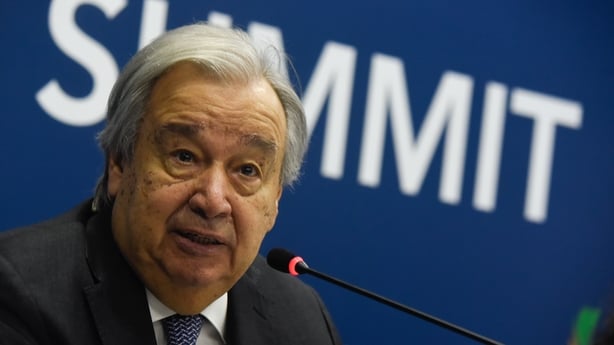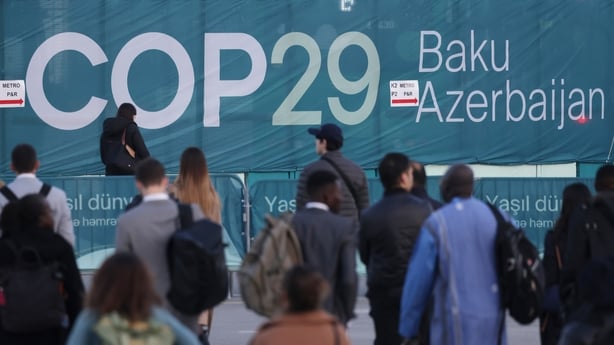Brazil's President Luiz Inacio Lula da Silva, also known as Lula, opened the summit of the Group of 20 (G20) major economies with the launch of a global alliance to combat poverty and hunger that more than 80 countries have agreed to back.
As G20 leaders met at Rio de Janeiro's Modern Art Museum for two days of talks, their agenda highlighted a shifting global order as US president-elect Donald Trump returns to power.
Their discussions of trade, climate change and international security will run up against the sharp US policy changes that Mr Trump vows upon taking office in January, from tariffs to the promise of a negotiated solution to the war in Ukraine.
In his opening remarks, Lula said the devastating effects of a changing climate can be seen around the world, calling for action by leaders on hand to address global warming and poverty.
The alliance he launched, coordinating global efforts to eradicate hunger and poverty, is backed by the African Union and European Union, international organizations, development banks and philanthropies such as the Rockefeller Foundation and the Bill & Melinda Gates Foundation.
"Hunger and poverty are not the result of scarcity or natural phenomena ... they are the product of political decisions," said Lula, who was born in poverty and entered politics organizing a metalworkers union.
"In a world that produces almost 6 billion tons of food per year, this is unacceptable," he said.
Diplomats drafting a joint statement for the summit's leaders have struggled to hold together a fragile agreement on how to address the escalating Ukraine war, even a vague call for peace without criticism of any participants, sources said.

A massive Russian air strike on Ukraine yesterday shook what little consensus they had established, with European diplomats pushing to revisit previously agreed language on global conflicts.
The United States has also lifted prior limits on Ukraine's use of US-made weapons to strike deep into Russia.
Russian President Vladimir Putin did not attend the summit, and Russia was represented by Foreign Minister Sergey Lavrov.
Security in Rio de Janeiro has been strengthened with troops reinforcing police for the duration of the summit which comes days after a failed bomb attack on Brazil's Supreme Court in Brasilia by a suspected far-right extremist, who killed himself in the process.
A Brazilian army patrol came under gunfire near a Rio de Janeiro slum in the hours before the summit began, police said.
No one was injured in the incident by the hillside Cidade de Deus community some 20km west of the G20 venue.
US President Joe Biden will attend his last summit of the world's leading economies, but as a lame duck leader eclipsed by Chinese President Xi Jinping, the most influential leader at this year's meeting.
The wars which have bitterly divided G20 members are also set to feature prominently in the discussions.
A Brazilian foreign ministry source that some countries wanted to renegotiate a draft summit communique.
"For Brazil and other countries the text is already finalized, but some countries want to open up some points on wars and climate," he said.
Mr Biden's reported decision to allow Ukraine to use long-range US missiles to strike targets inside Russia - a major policy shift - could prompt European allies to also review their stance.

Leaders under pressure to rescue COP29 climate talks
G20 leaders are also under pressure to try rescue UN climate talks in Azerbaijan, which have stalled on the issue of greater climate finance for developing countries.
UN Secretary-General António Guterres has called for G20 members, who account for 80% of global emissions, to show "leadership" to facilitate a deal.
The get-together will cap a farewell diplomatic tour by Biden which took him to Lima for a meeting of Asia-Pacific trading partners, and then to the Amazon in the first such visit for a sitting US president.
Mr Biden, who has looked to burnish his legacy as time runs down on his presidency, insisted in the Amazon that his climate record would survive another Trump mandate.
Read more:
New dynamics around COP mean current structure cannot deliver change at speed
All eyes at the stalled COP29 climate conference in Azerbaijan are on Rio to break an impasse over how to raise $1 trillion a year for developing countries to cope with global warming.
Rich countries want fast-developing economies like China and Gulf states to also put their hands in their pockets.
The meeting comes in a year marked by another grim litany of extreme weather events, including Brazil's worst wildfire season in over a decade, fuelled by a record drought blamed at least partly on climate change.
At the last G20 in India, leaders called for a tripling of renewable energy sources by the end of the decade, but without explicitly calling for an end to the use of fossil fuels.
Conspicuously absent from the summit is Russian President Vladimir Putin, whose arrest is sought by the International Criminal Court over the Ukraine war.
Lula told Brazil's GloboNews channel yesterday that he did not want the wars in Ukraine and the Middle East to take the focus off global poverty.
"Because if not, we will not discuss other things which are more important for people that are not at war, who are poor people and invisible to the world," he said.

COP29 President calls for parties to move faster in negotiations
The President of COP29 has called on all parties to move faster in the negotiations about providing one trillion dollars per year in climate finance for emerging markets and developing countries.
Mukhtar Babayev also called for leaders of the G20 countries to send a signal to their negotiators and provide a clear mandate for them to complete a climate finance deal.
The G20 countries account for 85% of global economic output, or GDP, and for 80% of global greenhouse gas emissions.
Mr Babayev said that the climate talks in Baku cannot succeed with the support of the leaders attending the G20 meeting in Brazil.
Halfway through the two-week-long COP29 climate talks progress has been described as slow, particularly in relation to climate finance, the key issue that will determine whether COP28 is deemed to be a success or not.
A draft agreement text document which was nine pages long on the eve of the negotiations ballooned to 34 pages on day one.
According to the latest information this document has now been reduced again to 25 pages but needs to be brought down to a far smaller size which would involve decisions about the myriad options and difficult choices it currently contains.
United Nations Climate Executive Secretary Simon Stiell described progress made after a week of negotiations as "mixed".
He said a very strong signal was sent last week from two of the G20 countries, Brazil and the UK, both of whom increased their own Nationally Determined Contributions, or official emissions-cutting commitment, and that both stated doing so was in their own national self-interest.
Additional reporting George Lee

